Key takeaways:
- Urban telematics networks integrate data from city infrastructure, enhancing efficiency in areas like traffic management and waste collection.
- Community involvement in waste reduction initiatives fosters accountability and inspires collective efforts towards sustainability.
- Telematics improves waste management through real-time data, predictive analytics, and enhanced communication with residents.
- Personal strategies like mindful shopping, meal planning, and composting significantly contribute to reducing an individual’s waste footprint.

Understanding Urban Telematics Networks
Urban telematics networks are fascinating systems that harness data from various urban components, enabling smarter city management. I remember my first experience with this technology when I noted how real-time traffic updates significantly reduced my daily commute. It got me thinking—how much smoother could urban life be if more neighborhoods adopted this approach?
At their core, urban telematics networks integrate communication technologies with city infrastructure. When I look at the way my local city implements these systems, it strikes me how they can enhance everything from waste management to transportation efficiency. It’s an intricate dance of data that makes daily living just a bit easier and more efficient.
As I delve deeper into the workings of these networks, I can’t help but wonder about their potential for reducing waste. For instance, the ability to analyze data on waste collection schedules can lead to optimized routes, saving both time and resources. It’s a powerful reminder of how technology can pave the way for a more sustainable urban environment, which is a goal we should all strive toward.
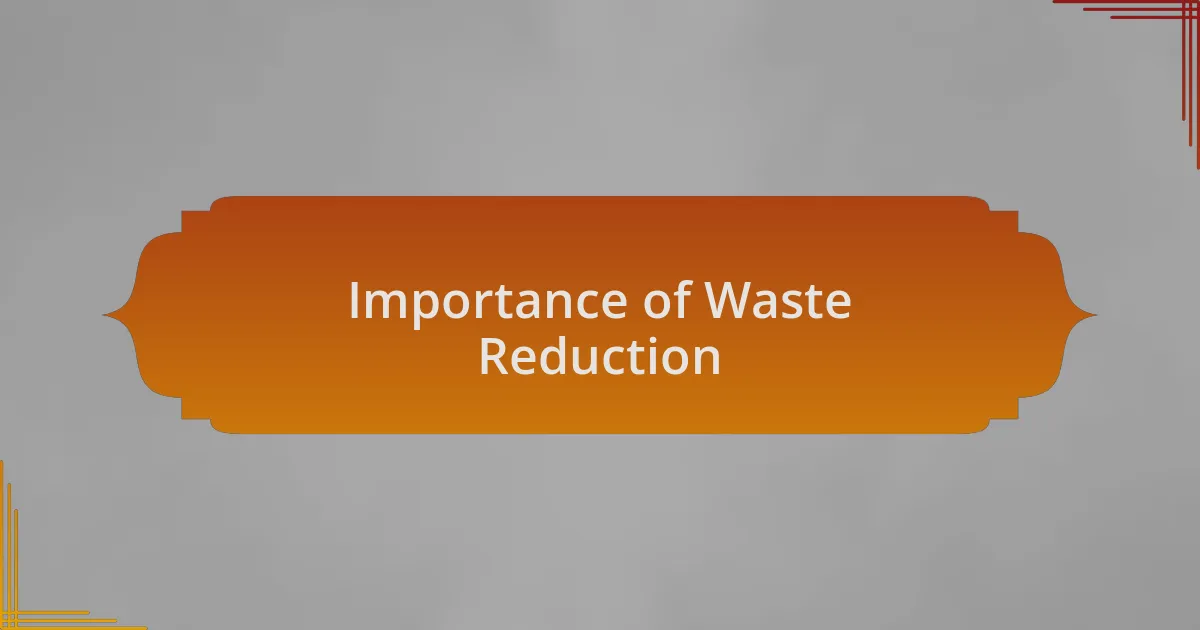
Importance of Waste Reduction
Reducing waste is crucial for the sustainability of our urban environments. I remember the first time I realized the impact of my waste habits; it was startling to see my trash bin overflowing after just a week. This made me think—what if everyone committed to waste reduction? The cumulative effect could be monumental, leading to cleaner streets and less strain on landfills.
In my neighborhood, I’ve seen first-hand how waste reduction initiatives inspire community involvement. When my local group organized a recycling drive, I felt a deep sense of camaraderie. It’s not just about the physical act of recycling; it fosters a collective consciousness aimed at nurturing our environment. Engaging with others in this regard makes us all more accountable, right?
Moreover, waste reduction is intertwined with safeguarding our natural resources. When I reduced my single-use plastics, I noticed fewer items piling up in my recycling bin. This small step not only helped the environment but also empowered me. It left me wondering—if we all took responsibility for our waste, could we change the narrative on urban pollution? Absolutely, and it starts with each of us making conscious choices.
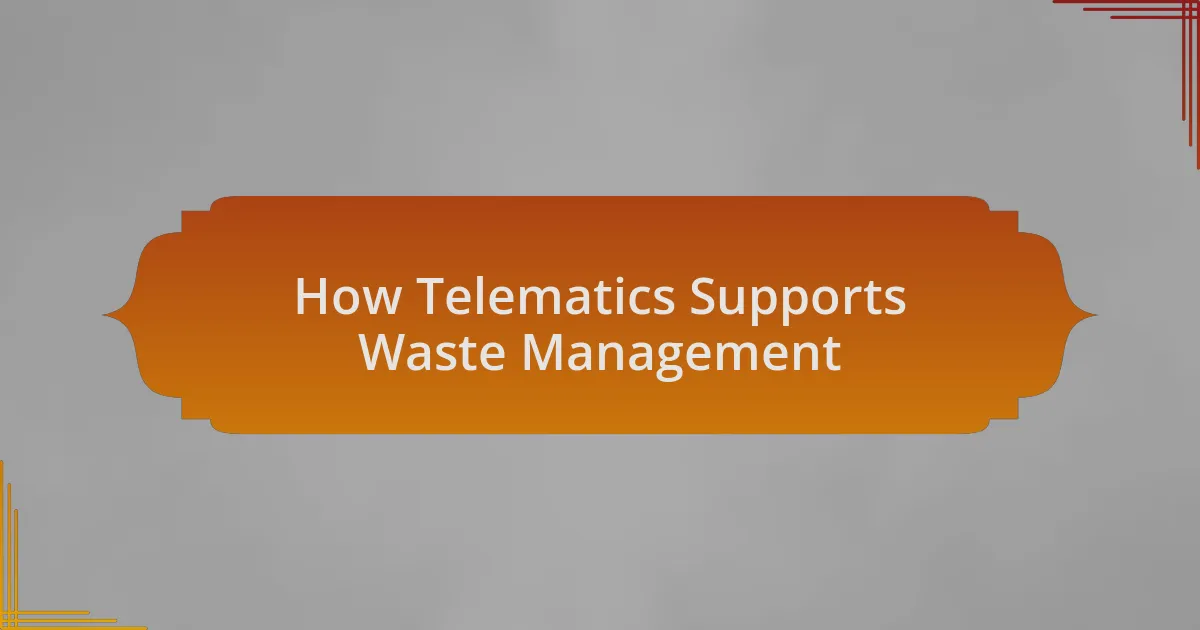
How Telematics Supports Waste Management
Telematics plays a pivotal role in enhancing waste management systems in urban settings. I remember a time when waste collection schedules seemed erratic and inefficient. With the introduction of telematics, I often noticed that collection trucks were now dispatched based on real-time data, which not only optimized routes but also reduced unnecessary fuel consumption. Isn’t it amazing how technology can streamline something as fundamental as waste disposal?
Furthermore, the data gathered through telematics systems enables cities to predict waste generation patterns. For instance, after installing smart bins in my area, I observed that the collection frequency adjusted according to the actual needs of the community. It was a breath of fresh air to see less overflowing trash in public spaces. Such proactive measures can lead to cleaner streets, making me wonder how many other urban areas could benefit from similar innovations.
Finally, telematics improves communication between waste management services and residents. When I received updates about pick-up schedules and changes via a mobile app, it helped me make better waste disposal choices. Knowing when to put out my recycling made me feel more engaged in my community’s efforts. Isn’t it refreshing to see how technology can foster deeper connections around something as essential as waste management?

Practical Applications of Telematics
The integration of telematics in urban waste management has opened up exciting avenues for enhancing efficiency. For example, when my local waste management team adopted GPS tracking for their trucks, I witnessed a remarkable decrease in missed pickups. It was a relief to see that my neighbors and I no longer faced sporadic rubbish collection; instead, our streets were frequently cleared on schedule. Have you ever experienced the frustration of irregular waste collection?
Another fascinating application is the use of real-time monitoring sensors in dumpsters. Once, I found myself eagerly checking an app that informed me about the fill levels of nearby bins. It was empowering to know exactly when a bin was nearing capacity, which encouraged me to plan my disposal times more strategically. I couldn’t help but smile when I saw how this small adjustment led to a tidier neighborhood, illustrating the tangible impact telematics can have on community cleanliness.
Telematics also supports data-driven decision-making for resource allocation. I recall attending a city council meeting where they shared insights derived from telematics regarding waste generation hotspots. This provided a clear direction for improving services in areas that needed it the most. Isn’t it intriguing how data can turn abstract needs into concrete actions? This not only ensures efficient use of resources but fosters a sense of community involvement in shaping our urban environment.
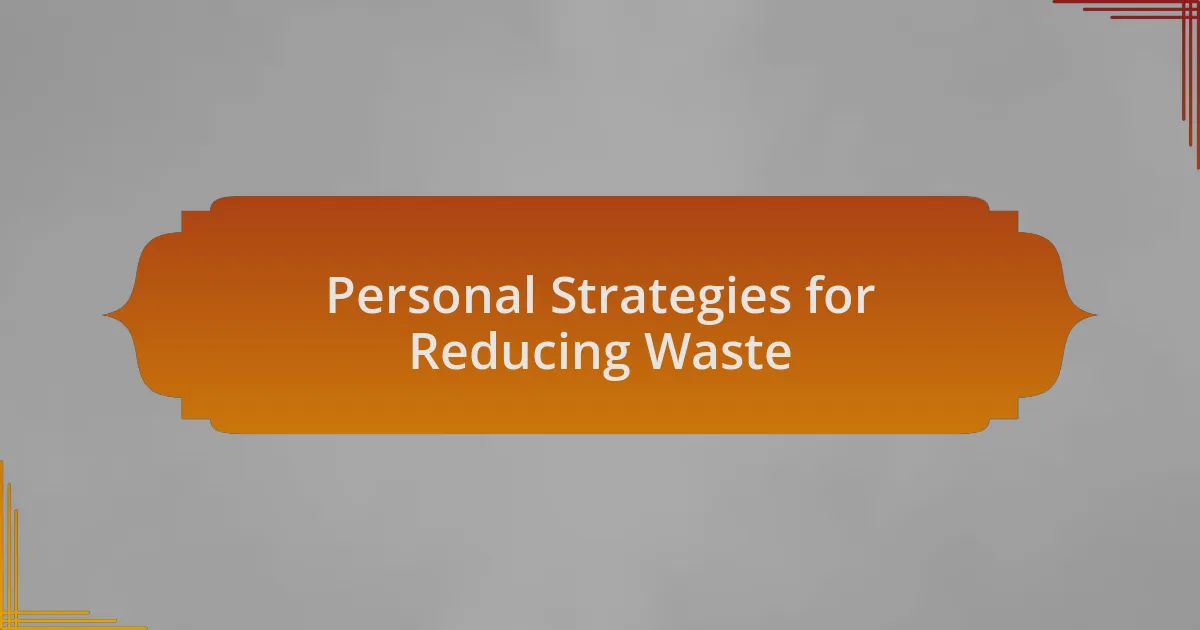
Personal Strategies for Reducing Waste
In my journey toward reducing waste, one of the most impactful strategies I’ve embraced is the practice of mindful shopping. I remember when I started bringing my reusable bags to the grocery store—initially a small effort, but it quickly became a habit. Have you ever noticed how easy it is to accumulate single-use plastic bags? Now, every time I opt for my cloth bags, I feel a sense of pride, knowing I’m contributing less to landfill overflow.
Another effective tactic has been meal planning. I found that when I take a few moments to decide what meals I want for the week, my grocery purchases are more intentional. This not only reduces food waste, but it also helps me save money. It’s incredible how something as simple as a list can keep my fridge stocked with only what I need, making me more aware of what I can realistically consume.
Lastly, I’ve discovered the joy of composting. Starting my compost bin was a game changer for my household waste management. It’s often surprising to see how many scraps—vegetable peels or stale bread—can actually be transformed into nutrient-rich soil. Just thinking about how my kitchen waste contributes to a healthier garden fills me with a sense of connection to the environment. Wouldn’t you agree that turning waste into something beneficial can be a rewarding experience?
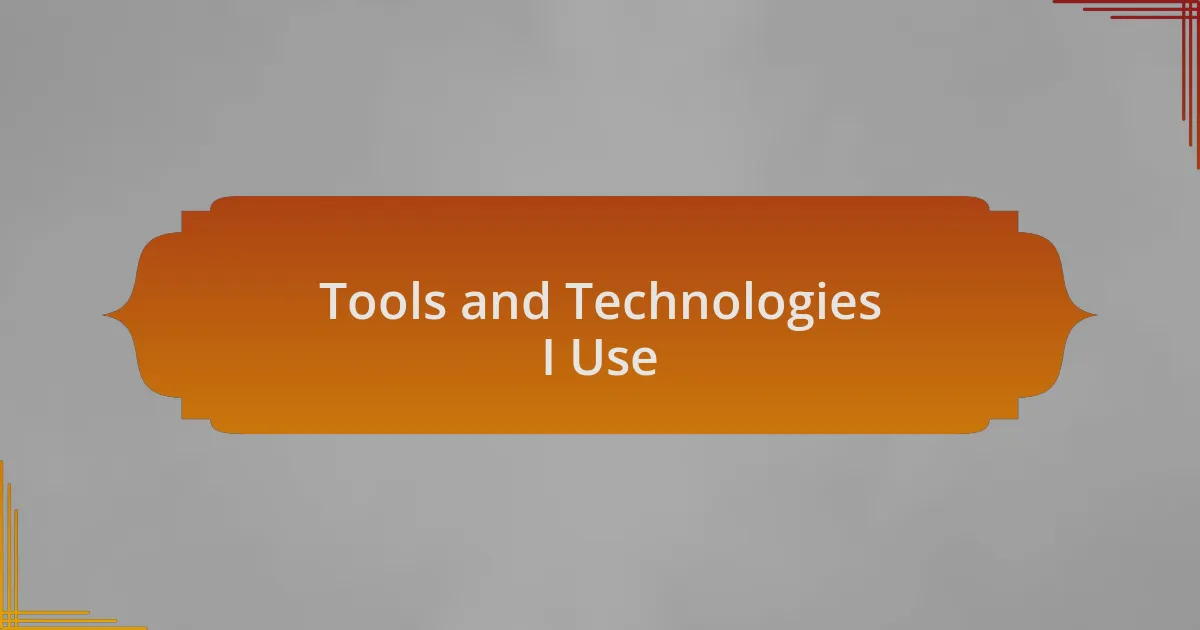
Tools and Technologies I Use
One of the essential tools I rely on is a smart waste management app. When I first downloaded it, I didn’t expect it to revolutionize how I track my waste. By logging what I throw away, I’ve gained valuable insights into what I typically discard, allowing me to adjust my consumption habits. Have you ever taken a moment to really see what you’re tossing out? That data has motivated me to make more conscious choices.
I also use a kitchen scale to measure my food waste. Honestly, it might sound a bit excessive, but this small device opened my eyes to the actual amount of food I was throwing away. It’s startling how quickly things add up—overripe fruits, forgotten leftovers. Now, every time I weigh my waste, I feel a sense of accountability that pushes me to minimize what ends up in the trash.
Finally, I often turn to community platforms that promote sharing and trading. For instance, I’ve participated in local exchanges for items I no longer need. It feels great to pass along something that could be useful to someone else—there’s a certain satisfaction in knowing that my old books or clothes are finding new homes instead of heading to a landfill. Have you ever tried something like that? The sense of community it fosters is truly rewarding, and it’s a win-win for both myself and the environment.
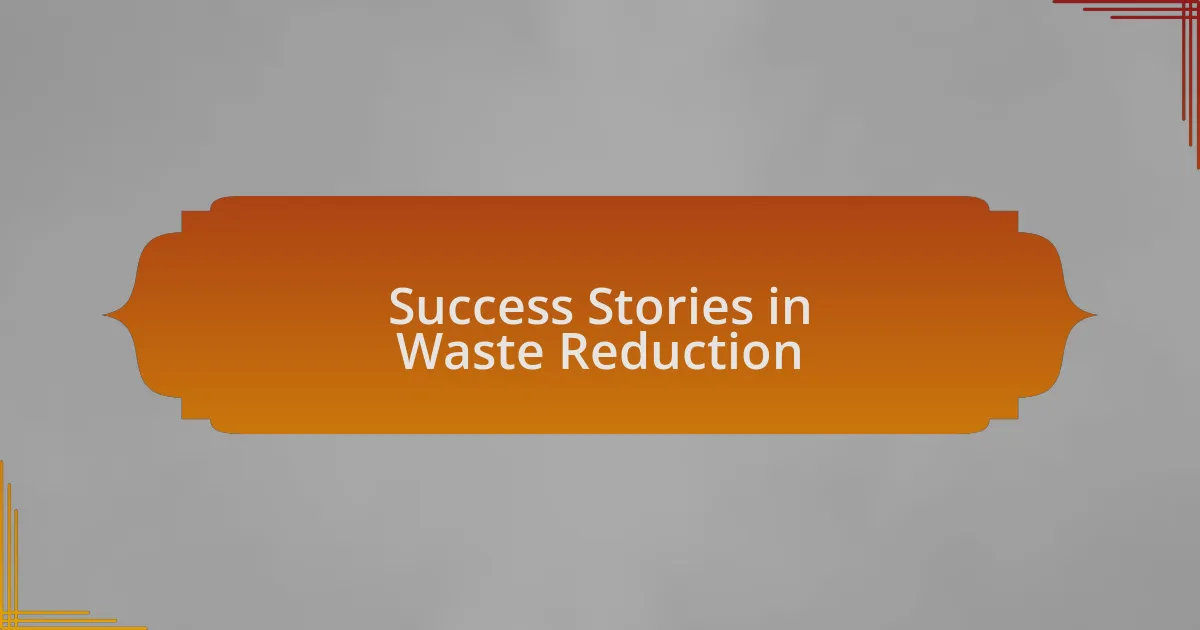
Success Stories in Waste Reduction
One compelling success story in waste reduction comes from my neighbor, who launched a community composting initiative last year. Initially, I was skeptical about how many people would participate, but to my surprise, more than 50 households joined. Witnessing our community come together to turn kitchen scraps into nutrient-rich soil not only reduced our waste but also fostered a sense of belonging. What could be more fulfilling than transforming our food waste into something beneficial for our gardens and environment?
Another inspiring example comes from my friend’s cafe, which implemented a zero-waste policy. At first, they were overwhelmed by the challenge, but their innovative solutions, such as repurposing coffee grounds into beauty products or donating unsold food, made a significant impact. This shift not only reduced their waste but also attracted customers who valued sustainability. Have you ever considered how your favorite local businesses could improve their waste practices? It’s a reminder that even small changes can lead to substantial results.
Lastly, I remember a workshop I attended on plastic reduction, where participants shared their experiences with eliminating single-use items. One attendee recounted how switching to reusable bags and containers not only cut down their plastic waste but also inspired their friends to do the same. It was a powerful epiphany: personal choices resonate far beyond one’s immediate circle. Have you ever thought about how your habits might influence others?